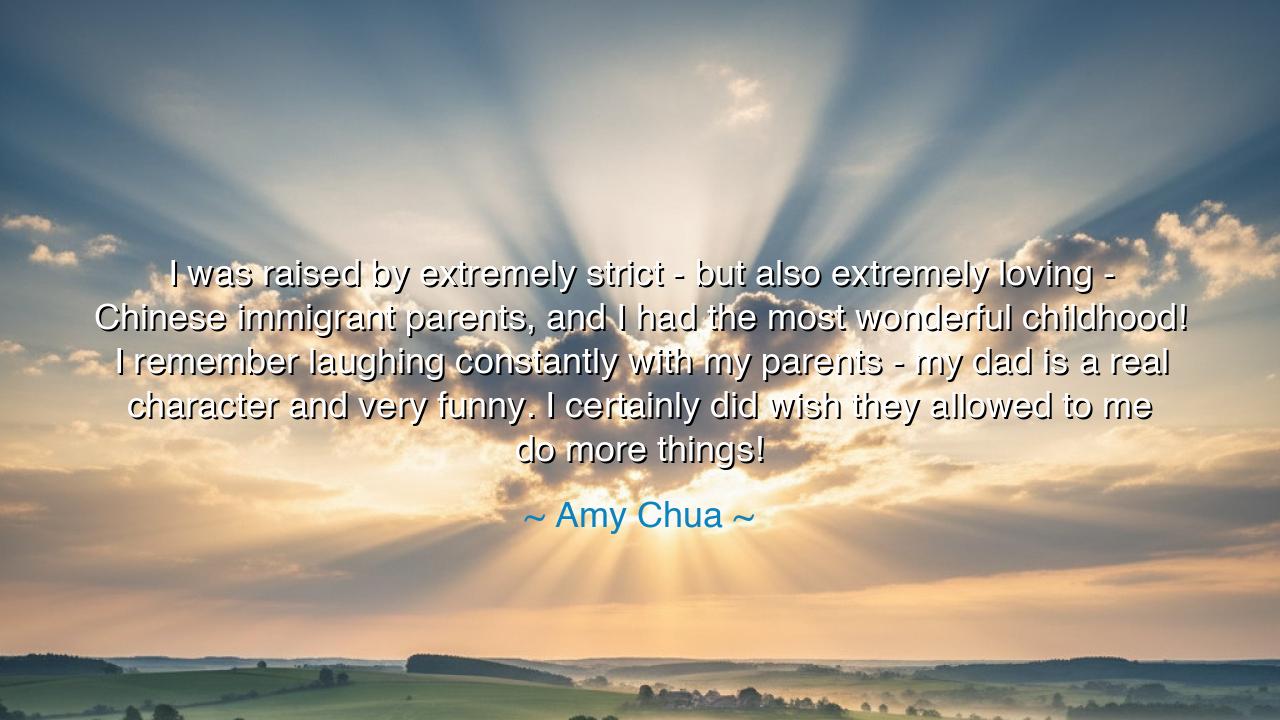
I was raised by extremely strict - but also extremely loving -
I was raised by extremely strict - but also extremely loving - Chinese immigrant parents, and I had the most wonderful childhood! I remember laughing constantly with my parents - my dad is a real character and very funny. I certainly did wish they allowed to me do more things!






The words, “I was raised by extremely strict – but also extremely loving – Chinese immigrant parents, and I had the most wonderful childhood! I remember laughing constantly with my parents – my dad is a real character and very funny. I certainly did wish they allowed me to do more things!”, were spoken by Amy Chua, the Chinese-American author and professor best known for her reflections on family, discipline, and the meeting of Eastern and Western values. Beneath her words lies a truth that transcends culture and time: that love and discipline are not enemies, but twin forces that, when balanced, forge both strength and joy. Her remembrance of childhood—one filled with both rules and laughter—speaks of the harmony between structure and affection, the ancient balance between order and freedom that has shaped families and civilizations alike.
To the ancients, this duality was sacred. The philosopher Confucius taught that harmony within the family was the foundation of harmony within the world. He saw love as the heart of duty, and duty as the guardian of love. This is the essence of what Amy Chua describes when she recalls being raised by parents who were both “strict” and “loving.” It is not a contradiction, but a balance—a recognition that discipline without compassion becomes tyranny, while love without boundaries dissolves into chaos. Her parents, like so many who journeyed across oceans to build new lives, carried the wisdom of endurance: they demanded much, not from cruelty, but from belief in what their child could become.
Yet her memory is not one of resentment, but of laughter. “I remember laughing constantly with my parents,” she says—and this laughter is the thread that unites the heart of discipline with the warmth of affection. For in every strict household where love truly dwells, there is also humor. The ancients believed that laughter was the soul’s way of breathing freely even within rules. The Roman philosopher Seneca once wrote that a wise parent must “govern with mercy, and laugh with their children.” Amy Chua’s words mirror that wisdom—she shows that discipline can coexist with joy, that rules need not banish affection, and that love expressed through guidance is no less tender than love expressed through indulgence.
The image she paints—of immigrant parents balancing old-world expectations with new-world hopes—is one that has echoed through history. Consider the story of the first generations of immigrants who came to new lands, bearing the weight of their ancestors’ traditions and the dreams of their children’s future. They demanded excellence because they had suffered scarcity; they imposed rules because they had known chaos. Yet behind every stern word was a heart aflame with love, a heart that prayed their children might live freer lives than their own. Amy Chua’s story, though deeply personal, reflects this ancient pattern: the discipline of the past nurturing the freedom of the future.
Her words also carry the tender ache of wishing for more freedom—“I certainly did wish they allowed me to do more things!” Here lies the eternal longing of youth: the desire to break the boundaries that shape us. And yet, in her tone, there is no bitterness—only gratitude, softened by memory. She understands now that the limits her parents set were the soil from which her independence later grew. The ancients would call this understanding filial wisdom: the realization that love often disguises itself as restraint, that what once felt like confinement was, in truth, protection.
In her reflection, we see that strictness and love are not opposites but complements. The modern world often misunderstands this balance—some fear that strictness extinguishes affection, while others believe love weakens authority. But Amy Chua’s memory reminds us that the strongest bonds are those that contain both strength and tenderness, laughter and law. Just as a tree needs both sunlight and deep roots, a child needs both freedom and guidance. Her father’s humor, her mother’s rules—these were not contradictions but the two hands that shaped her character.
So, my child, take this lesson to heart: do not mistake boundaries for coldness, nor affection for weakness. The ones who love you most may demand the most from you, not to diminish your joy, but to preserve your greatness. And if you are a parent, mentor, or guide, learn from Amy Chua’s story—let your discipline be rooted in love, and your love be shaped by wisdom. Laugh with those you lead, even as you set their path straight. For laughter is the bridge between the heart’s warmth and the mind’s order.
In the end, Amy Chua’s words remind us that the finest childhoods—and the finest lives—are not those without limits, but those where love and discipline walk hand in hand. To live with both is to know balance; to remember both is to honor those who raised us. So be grateful for the rules that shaped you, and for the laughter that softened them. For in that union lies the eternal art of family—the art of shaping souls through love that guides, and guidance that loves.






AAdministratorAdministrator
Welcome, honored guests. Please leave a comment, we will respond soon